“Global Quantum AI Market to reach a market value of 2.1 Billion by 2031 growing at a CAGR of 35.1%”
The Global Quantum AI Market size is expected to reach $2.1 billion by 2031, rising at a market growth of 35.1% CAGR during the forecast period.
Europe has made significant strides in quantum research, supported by large-scale initiatives such as the European Union's Quantum Flagship program, which aims to position Europe as a leader in quantum technologies. Consequently, the European region would acquire nearly 30% of the total market share by 2031.
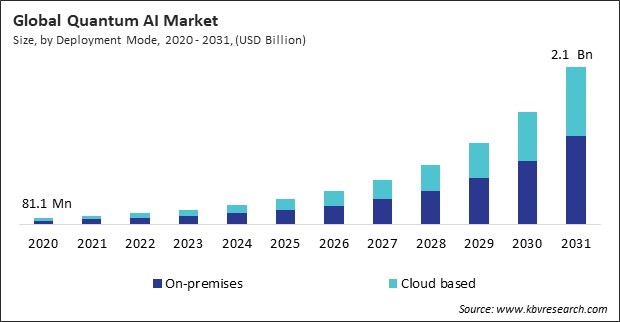
The major strategies followed by the market participants are Partnerships as the key developmental strategy to keep pace with the changing demands of end users. For instance, in September, 2024, Toshiba Digital Solutions Corporation formed a collaboration with SpeQtral, a prominent quantum communications technology firm, and ST Engineering, a global technology, defense, and engineering group. This agreement formalizes their strategic alliance and aims to enhance their go-to-market strategy for quantum-secure communications solutions across Singapore and Southeast Asia. The collaboration will focus on advancing quantum security solutions through joint market and business development, creating customized product and solution offerings, and exploring opportunities within the government sector. Moreover, in August, 2024, Fujitsu Limited joined hands with Center for Quantum Information and Quantum Biology at Osaka University (QIQB) on two innovative technologies designed for the space-time efficient analog rotation quantum computing architecture. These advancements are set to significantly advance the development of practical quantum computing. Fujitsu and QIQB have utilized these new technologies—one enhancing phase angle accuracy during phase rotation, and the other automating the generation of efficient qubit operation procedures—to demonstrate that a quantum computer could theoretically complete a calculation in ten hours that would take a classical computer five years.
Based on the Analysis presented in the KBV Cardinal matrix; Microsoft Corporation and Google LLC are the forerunners in the Market. In April, 2024, Microsoft, in collaboration with Quantinuum, the world's largest integrated quantum computing company, has achieved a groundbreaking milestone in fault-tolerant quantum computing. Together, they demonstrated the most reliable logical qubits with active syndrome extraction—an accomplishment that was previously thought to be years away. This partnership marks a significant step forward for the industry, highlighting a critical milestone on the journey toward hybrid classical-quantum supercomputing, which has the potential to revolutionize scientific discovery. Companies such as Amazon Web Services, Inc., IBM Corporation and Fujitsu Limited are some of the key innovators in Market.
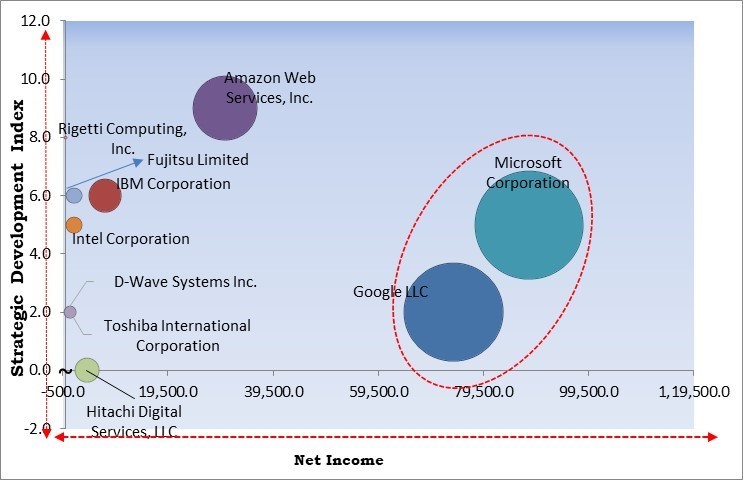
Governments across the globe are allocating significant resources to fund quantum research initiatives, aiming to position their countries at the forefront of this emerging field. On the private sector side, tech giants like IBM, Google, and Microsoft are in charge of developing quantum computers and these AI solutions. Hence, these concerted efforts are driving market growth.
Quantum AI has the potential to dramatically enhance the accuracy of molecular simulations, which is critical for understanding the intricate structures and behaviors of biological molecules. One of the most promising applications of this AI in healthcare is in the area of drug discovery. The pharmaceutical industry is renowned for its extensive and costly drug development cycles, which frequently require over a decade and billions of dollars to market a new drug. Thus, the growing applications of this AI in healthcare and drug discovery are driving significant advancements in medical research and, in turn, market growth.
Developing and maintaining quantum computers requires expensive specialized infrastructure, such as cryogenic systems and vacuum chambers, essential for maintaining the delicate quantum states of qubits. Moreover, the ongoing costs of maintaining and upgrading quantum systems add to the financial burden, with companies needing to invest continuously in new hardware and software to remain competitive. Hence, the high costs of quantum technology pose a substantial obstacle to the widespread adoption and growth of this AI, limiting its potential impact across various industries.
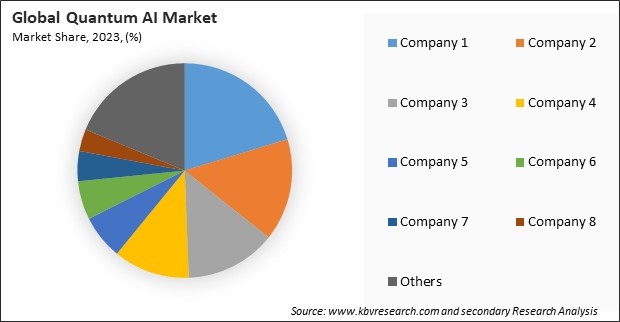
The leading players in the market are competing with diverse innovative offerings to remain competitive in the market. The above illustration shows the percentage of revenue shared by some of the leading companies in the market. The leading players of the market are adopting various strategies in order to cater demand coming from the different industries. The key developmental strategies in the market are Partnerships & Collaborations.
Based on deployment mode, the market is bifurcated into on-premises and cloud based. The cloud based segment procured 42% revenue share in the market in 2023. Cloud-based AI solutions are gaining traction due to their flexibility, scalability, and accessibility. They enable organizations to capitalize on quantum computing capabilities without making considerable initial investments in hardware and infrastructure.
On the basis of application, the market is segmented into machine learning & optimization, cryptography & security, and simulation & modeling. The cryptography & security segment procured 19% revenue share in the market in 2023. Quantum computing's potential to revolutionize cryptography is a major driver of this segment's growth.
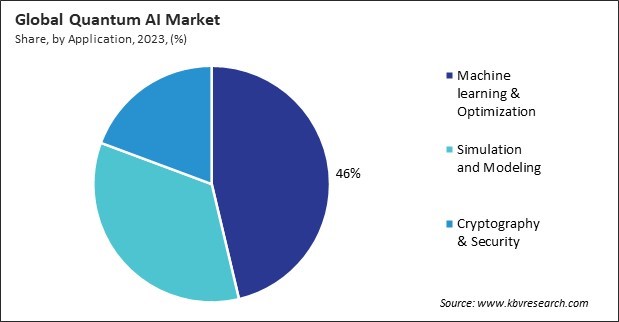
By component, the market is segmented into hardware, software, and services. The software segment procured 35% revenue share in the market in 2023. As quantum hardware continues to evolve, there is a growing need for specialized software to effectively leverage quantum computing's capabilities for AI applications.
Free Valuable Insights: Global Quantum AI Market size to reach USD 2.1 Billion by 2031
Region-wise, the market is analyzed across North America, Europe, Asia Pacific, and LAMEA. The North America segment garnered 44% revenue share in the market in 2023. This dominance is due to the region's robust technological infrastructure, significant investment in quantum research, and the leadership of major technology corporations in the development of this AI.
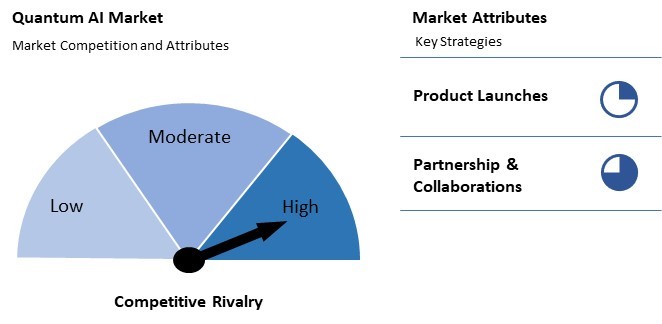
The competition in the market is intense, with tech giants and startups vying for breakthroughs in quantum computing applications for AI. Companies focus on developing scalable quantum algorithms and hardware. Strategic collaborations, investments, and advancements in quantum machine learning are accelerating the competitive dynamics in this emerging field.
| Report Attribute | Details |
|---|---|
| Market size value in 2023 | USD 193.8 Million |
| Market size forecast in 2031 | USD 2.1 Billion |
| Base Year | 2023 |
| Historical Period | 2020 to 2022 |
| Forecast Period | 2024 to 2031 |
| Revenue Growth Rate | CAGR of 35.1% from 2024 to 2031 |
| Number of Pages | 227 |
| Tables | 342 |
| Report coverage | Market Trends, Revenue Estimation and Forecast, Segmentation Analysis, Regional and Country Breakdown, Competitive Landscape, Market Share Analysis, Porter’s 5 Forces Analysis, Company Profiling, Companies Strategic Developments, SWOT Analysis, Winning Imperatives |
| Segments covered | Component, Deployment Mode, Application, Region |
| Country scope |
|
| Companies Included | Amazon Web Services, Inc. (Amazon.com, Inc.), Microsoft Corporation, Google LLC, IBM Corporation, Fujitsu Limited, Intel Corporation, Toshiba Corporation, Rigetti Computing, Inc., D-Wave Systems Inc. and Hitachi Digital Services, LLC (Hitachi Ltd.) |
By Deployment Mode
By Application
By Component
By Geography
This Market size is expected to reach $2.1 billion by 2031.
Rising investment in quantum technology are driving the Market in coming years, however, High costs of quantum technology restraints the growth of the Market.
Amazon Web Services, Inc. (Amazon.com, Inc.), Microsoft Corporation, Google LLC, IBM Corporation, Fujitsu Limited, Intel Corporation, Toshiba Corporation, Rigetti Computing, Inc., D-Wave Systems Inc. and Hitachi Digital Services, LLC (Hitachi Ltd.)
The expected CAGR of this Market is 35.1% from 2024 to 2031.
The Machine learning & Optimization segment led the Market by Application in 2023; thereby, achieving a market value of $919.8 million by 2031.
The North America region dominated the Market by Region in 2023, and would continue to be a dominant market till 2031; thereby, achieving a market value of $873.2 million by 2031.
Our team of dedicated experts can provide you with attractive expansion opportunities for your business.

 Drivers
Drivers
 Restraints
Restraints
 Opportunities
Opportunities
 Challenges
Challenges
